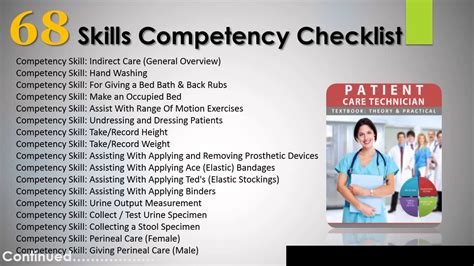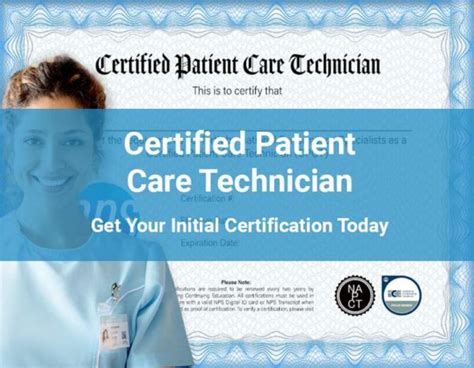Intro
Discover the essential role of a Patient Care Technician in healthcare. Learn about the job description, responsibilities, and skills required to excel in this position. Explore the daily tasks, patient interaction, and medical procedures involved in this rewarding career, and find out how to become a vital part of a healthcare team.
As the healthcare industry continues to evolve, the role of a Patient Care Technician (PCT) has become increasingly important. A PCT is a vital member of the healthcare team, providing direct patient care and support to nurses, doctors, and other medical professionals. In this article, we will delve into the world of Patient Care Technicians, exploring their job description, responsibilities, and the skills required to excel in this rewarding career.

What is a Patient Care Technician?
A Patient Care Technician is a healthcare professional who provides direct patient care under the supervision of a licensed nurse or physician. PCTs work in a variety of healthcare settings, including hospitals, clinics, nursing homes, and assisted living facilities. Their primary responsibility is to ensure that patients receive the highest quality care, while also supporting the healthcare team with administrative and clinical tasks.
Key Responsibilities of a Patient Care Technician
While the specific responsibilities of a PCT may vary depending on the healthcare setting, here are some of the key duties and responsibilities associated with this role:
Direct Patient Care
- Assist patients with daily living activities, such as bathing, dressing, and grooming
- Take vital signs, including temperature, blood pressure, and pulse
- Monitor patients' conditions and report any changes to the healthcare team
- Provide basic care, such as feeding, toileting, and transferring patients
Administrative Tasks
- Answer phone calls and respond to patient inquiries
- Maintain accurate and up-to-date patient records
- Prepare patients for exams and procedures
- Assist with scheduling appointments and managing patient flow
Clinical Support
- Assist nurses and doctors with medical procedures, such as taking blood samples and preparing patients for surgery
- Administer medications and treatments as directed by a licensed healthcare professional
- Monitor patients' responses to medications and report any adverse reactions
- Assist with wound care and dressing changes
Skills and Qualifications Required
To be successful as a Patient Care Technician, you will need to possess a combination of technical, interpersonal, and communication skills. Here are some of the key skills and qualifications required for this role:
Technical Skills
- Basic life support certification (BLS)
- Phlebotomy certification (optional)
- Electronic medical record (EMR) system experience
- Basic computer skills, including Microsoft Office and email
Interpersonal Skills
- Excellent communication and interpersonal skills
- Ability to work effectively with patients, families, and healthcare teams
- Compassion, empathy, and a caring attitude
- Ability to maintain patient confidentiality and adhere to HIPAA regulations
Physical Demands
- Ability to lift, transfer, and move patients safely
- Ability to stand for long periods and walk extensively
- Ability to work in a fast-paced environment with frequent interruptions

Education and Training
While a high school diploma or equivalent is typically required to become a Patient Care Technician, many employers prefer candidates with a post-secondary certificate or diploma in a related field, such as nursing or healthcare technology. Additionally, many states require PCTs to complete a state-approved training program and pass a certification exam to become certified.
Certification and Licensure
Certification is not always required, but it is highly recommended to become certified as a Patient Care Technician. The National Healthcareer Association (NHA) offers a Certified Clinical Medical Assistant (CCMA) certification, which is recognized nationally. Some states also require licensure to practice as a PCT.

Career Advancement Opportunities
As a Patient Care Technician, you will have opportunities to advance your career in various ways. With experience and additional education, you can move into roles such as:
- Licensed Practical Nurse (LPN) or Licensed Vocational Nurse (LVN)
- Registered Nurse (RN)
- Medical Assistant
- Healthcare Administrator
Conclusion
In conclusion, a Patient Care Technician plays a vital role in the healthcare team, providing direct patient care and support to nurses, doctors, and other medical professionals. With a strong foundation in technical, interpersonal, and communication skills, you can excel in this rewarding career and make a positive impact on patients' lives. If you are passionate about healthcare and enjoy working with people, a career as a Patient Care Technician may be the perfect fit for you.
FAQs
What is the average salary for a Patient Care Technician?
+The average salary for a Patient Care Technician varies depending on location, experience, and employer. According to the Bureau of Labor Statistics, the median annual salary for PCTs is around $34,000.
Do I need to be certified to work as a Patient Care Technician?
+Certification is not always required, but it is highly recommended to become certified as a Patient Care Technician. The National Healthcareer Association (NHA) offers a Certified Clinical Medical Assistant (CCMA) certification, which is recognized nationally.
What kind of education and training do I need to become a Patient Care Technician?
+While a high school diploma or equivalent is typically required, many employers prefer candidates with a post-secondary certificate or diploma in a related field, such as nursing or healthcare technology.
